This is an English translation of an article from the Ukrainian news website, The Union of Orthodox Journalists.
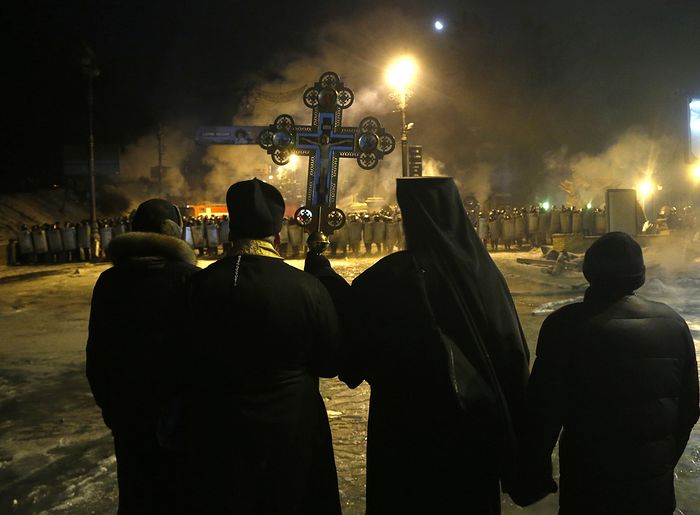 The monks of the Tithes Monastery in Kiev, standing for peace between police and Maidan revolutionaries. This monastery would later become a victim of arson perpetrated by Ukrainian nationalists.
The monks of the Tithes Monastery in Kiev, standing for peace between police and Maidan revolutionaries. This monastery would later become a victim of arson perpetrated by Ukrainian nationalists. Dubious initiatives by the Phanar in Ukraine are becoming increasingly puzzling; but is Patriarch Bartholomew really free in his actions?
In many publications devoted to the topic of Ukrainian autocephaly and the corresponding Tomos, the idea is expressed that the Phanar, with the aim of asserting his rule and exclusivity in the Orthodox world, decided to take advantage of an opportune situation in Ukraine—using it as an opportunity to declare himself “canonical head” of all Ukrainian Orthodoxy, as a leader “who will come and establish order”[1]. This is the very “order” which he alleges the Russian Orthodox Church has been unable to bring to its canonical territory for over 25 years.
Proponents of this idea argue that the appeal of the Ukrainian President on Autocephaly fell on favorable grounds for Constantinople, and that in this initiative of President Petro Poroshenko, the Phanar saw for itself the opportunity to realize its claims of supremacy on the ground.
That point of view has the right to exist, and many circumstances speak to its favor—but the argument that Constantinople is actually trying to become an “Orthodox Vatican” by interfering in Church affairs in Ukraine will come true only in one case.
And that is: If all the other Local Orthodox Churches agree with the lawfulness of the actions of Constantinople.
In layman’s terms: If they swallow the tricks of the Phanar in Ukraine.
If this does not turn out to be the case, then Constantinople will definitely lose in this religious-geopolitical game, and will lose even the position in the Orthodox world that it occupies now.
In the worst-case scenario for Patriarch Bartholomew, a Pan-Orthodox Council may gather, in which the Ecumenical Patriarch would be condemned for his "Papist” claims, for gross interference in the affairs of a different Local Church, and for ecumenical worship with the Catholics. The Constantinople (Istanbul) Patriarchate may well simply be abolished as unnecessary[2].
[This is] simply to restore historical justice, and taking into account that Constantinople is no longer “the city of the Emperor and the Senate” but instead Istanbul, which has for a long time not been an “Imperial City”, but instead a Turkish province, and to transfer it again to the subjection of the Metropolitan of Heraclea, which it was under until the year 381.[3]
What endgame scenario seems more likely? The rise of Constantinople to the level of “Orthodox Vatican” with a flock of 300 million, or its descent to the level of “Turkish Orthodox Church”?
In order to answer this question, it makes sense to draw attention to the reaction of the Local Orthodox Churches to the events taking place in Ukraine, and to the level of support of these Churches of the canonical Ukrainian Orthodox Church. Here are some statements made by the Primates of the Local Churches and their hierarchs:
Patriarch Theophilos of Jerusalem: “The unity of the Church is a gift of the Holy Spirit, and we are called to preserve and strengthen it. The destruction of this unity is a serious crime.” “We condemn in the most categorical terms those who are committing actions directed against the parishes of the canonical Orthodox Church in the Ukraine. Not in vain do the holy fathers remind us that the violation of the Church’s unity is the gravest sin.
Patriarch Theodoros II of Alexandria and All Africa: “Let us pray to God, Who does all for our good, that He would instruct us all for a solution to these problems. If the schismatic Denisenko [the self-proclaimed “patriarch” of the schismatic “Kiev Patriarchate”—O.C.] wants to return to the bosom of the Church, then he must turn to where he left from. That which has fallen away must return to where it fell from. God is merciful to those who repent, and the Church forgives and receives in its motherly embrace all who repent.”
Patriarch John X of Antioch and All the East: “The Antiochian Church stands together with the Russian Church, speaking against the Church schism in Ukraine.”
Patriarch Ilya of Georgia: “His Beatitude disagrees with the initiative of the Ecumenical Patriarchate concerning Ukraine, as he recognizes only the legitimate Church headed by Metropolitan Onuphry.”
Holy Synod of the Serbian Orthodox Church: “[T]he Assembly expresses full solidarity, in co-suffering brotherly love, with the martyred sister Church in Ukraine, exposed to the harshest persecution by the current regime in Kiev.”
Holy Synod of the Polish Orthodox Church: “We express the clear position of the Polish Orthodox Church, namely that the ecclesiastical life of the canonical Orthodox Church should be based on the principles of dogma and the holy canons of the Orthodox Church. Violation of this principle leads to chaos in the life of the Church. “There are certain schismatic groups in Ukraine which must first repent and return to the canonical Church. Only then can we discuss the issue of providing autocephaly. “We must not be led by the political climate in questions of dogma and the canons.”
Met. Rostislav of Czech Lands and Slovakia: “A schism, caused by man’s egotism, can be healed only through repentance and returning to the Church,” the primate noted. “The new autocephaly must be the result of a consensus.”
Patriarch Neofit of Bulgaria: “I have always had a very good relationship with His Beatitude Metropolitan Onuphry [head of the Ukrainian Orthodox Church—MP.—O.C.]. We know that he loves the Ukrainian people and humbly labors for the good of Ukraine and all Orthodox Christians. We will be praying that the Lord grant him health and strength to successfully bear the obedience he was given by the Lord, and which he bears with dignity.”
Metropolitan George of Kitros, Katerini, and Platamon (Church of Greece): “The Greek Orthodox Church and all other Orthodox Churches of the world recognize only one canonical Church of Ukraine—the Ukrainian Orthodox Church headed by His Beatitude Metropolitan Onuphry.”
Metr. Athanasios of Limassol (Church of Cyprus): “First and foremost, this question should be resolved by the Patriarch of Moscow, in whose jurisdiction the Ukrainian Church is located, then—the canonical Ukrainian Orthodox Church, and then all the Orthodox Churches under the chairmanship of the Ecumenical Patriarchate,” Met. Anathasios stated. “But first of all, the first word is for the Mother Church of the Ukrainian Church, which is the Moscow Patriarchate. To it belongs the first word in this process. “What relationship does the Ecumenical Church have to the Philaret schism in Ukraine? How can it be overcome? We desire that our brothers who are in schism would return to the Church under the leadership of Metropolitan Onuphry—it is the sole canonical Church in Ukraine, having communion with the Moscow Patriarchate, and with all canonical Orthodox Churches… We pray for this.”
Out of the total of fifteen Local Orthodox Churches, twelve have already expressed unequivocal support for the UOC and Metropolitan Onufry. The American, Romanian, and Albanian Churches have not diplomatically indicated their position on this issue so far.
But it is an undeniable fact that at this moment, not one has expressed approval of the actions of the Constantinople Patriarchate in Ukraine.
In this way, it becomes clear that for Patriarch Bartholomew, the risk of getting called out for obstruction by all, or almost all Local Orthodox Churches is very high.
After all, the “Ukrainian Question” is an obvious precedent for the entire Orthodox world.[4] And none of the autocephalous—that is self-headed and independent Churches—want a citizen of Turkey to interfere in their affairs, whose activities are funded from the USA[5].
There is yet another important point which leads us to understand that the actions of Constantinople are not simply anticanonical [but also externally-politically motivated].
The Ecumenical Patriarchate in recent years, has clearly claimed to be the sole and indisputable head of all Orthodoxy.
Therefore, it makes sense to analyze in which historical moments was the idea of “Orthodox Papism”[6] formed in the minds of the Primates of Constantinople (or their foreign patrons), and under which historical conditions was it manifested?
Until the beginning of the 20th century, we do not hear any statements about the primacy or the exclusivity of the Phanar, and no claims to the canonical territories of other Churches, especially of all the Russian. There is no direct or indirect evidence, that Constantinople had given the Patriarchate of Moscow the Kievan Metropolia temporarily, and intended to take it back—this was never known in history.[7]
The first such statement dates back to 1924, when the Patriarch of Constantinople Gregory VII encroached on the canonical territory of the Russian Orthodox Church, and gave the Tomos of Autocephaly to the Polish Orthodox Church. Patriarch Bartholomew referred to this document in his speech on July 1, 2018:
In this spirit, the Mother Church did not concede its canonical rights over Ukraine, but incorporated a special reference in the Patriarchal and Synodal Tome “about the granting of the status of autocephaly to the Church of Poland” (1924), noting that “the original detachment from our Throne of the Metropolis of Kiev and its dependent Orthodox Churches of Lithuania and Poland, along with their attachment to the Holy Church of Moscow did not at all occur in accordance with the conventional canonical regulations; nor were the agreed statements about complete ecclesiastical self-sufficiency of the Metropolitan of Kiev, bearing the title of Exarch of the Ecumenical Throne, respected...[8]
In fact, when referring to the 1924 document as the basis for claims to the Metropolis of Kiev, Patriarch Bartholomew admitted that earlier documents simply did not exist, because if they did, it would have been better to refer to them, or even better, to those and others together.
And so, His All-Holiness recognized that between the Tomos of 1686 on the transfer of the Kievan Metropolia, and the 1924 Tomos on the Autocephaly of the Polish Church (i.e. for 238 years) Constantinople did not raise the question of the non-canonical or temporal nature of the transfer of the Kievan Metropolia.[9]
But let’s instead see what happened in 1924, and the years preceding it.
As a result of the defeat in the First World War (1914-1918), the Ottoman Empire was divided into several territories under the protection of France and Great Britain.
These are the modern states of: Syria, Lebanon, Iraq, Palestine, Saudi Arabia, and Yemen. A little later, in 1923, the Turkish Republic led by Kemal Ataturk was formed. In the same year, there was an exchange of people between Turkey and Greece, the result of which Turkey became practically a mono-ethnic state, and the Ecumenical Patriarch, as a result of this, lost almost all his flock.
The Republic of Turkey proclaimed the separation of religion from state, and no longer consider the Patriarch as the head of the “Rûm millet[10]”, a Christian population which in fact, was not actually in Turkey. Thus, the Phanar urgently had to seek a rationale for its own existence, for he actually became a “shepherd without a flock”. That’s when the first claims to rule over the entire Orthodox world appear.
Then the encroachments on the pretext of them being the “Mother Church” begin on the territory of the Russian Orthodox Church.[11] In 1923, Constantinople announced the inclusion in its territory of the Finnish Orthodox Church, which at that time was autonomous within the Russian Orthodox Church.
The Finns then requested autocephaly, but the Greeks accepted the Finnish Orthodox Church into their holdings, and they forgot about autocephaly.
In 1924, Constantinople declared its right to grant autocephaly to the Polish Church, which it did.
And then the idea suddenly emerged out of oblivion, that Constantinople did not transmit to Moscow the Kievan Metropolia, but simply gave Moscow “a chance to play around in Kiev”.[12]
All of this—the raider-style capture by the Phanar of another territory—became possible in fact, because of one simple reason.
After the Revolution of 1917 in the Russian Empire (which became the USSR in 1922), the Russian Orthodox Church was laid to ruins unprecedented in the history of the persecution of Christianity.
The Soviet state considered the physical destruction of churches and clergy as a part of its internal policies.
At the same time that the Russian Orthodox Church was carrying out its podvig of confession, when dozens of hierarchs and thousands of clerics were shot and thrown into jails, the Patriarchate of Constantinople declared itself to be the owner of its territories.
At the same time, the Phanar tarnished itself with yet another indelible mark of shame—the support and recognition of the “Living/Renovationist Church”, a fake Orthodox organization created on the initiative of the Bolsheviks to fight the Russian Church. They also made appeals to the Holy Patriarch (Saint) Tikhon to resign.[13]
The act of the annexation of the Polish Orthodox Church, by the diocese of the Phanar was committed at a time when the Holy Hierarch and Confessor Patriarch Tikhon was under arrest in the internal prison of the GPU (State Political Directorate)[14] and was threatened with execution.
Since the 1920s, the idea of papism has been gradually developing in the Phanar, being implemented in various initiatives. The Ecumenical Throne is proclaimed the head of the entire Orthodox Diaspora; then Constantinople would have the authority to represent the Orthodox world in dialog with Catholics and other religious organizations; then the Phanar would announce its exclusive right to convene Ecumenical Councils and to grant autocephaly; finally the Ecumenical Patriarchate would become the supreme judge in disputes between Local Orthodox Churches, or in conflicts between bishops with the leaders of their own Churches.
But all of these ideas were promoted by the Phanar against the backdrop of the significant weakening, to say the least, of the Russian Orthodox Church and its influence in the world.
Today, however, we are witnessing a completely different situation. Of course, the significance today of the Russian Orthodox Church, and its place in the state is not quite the same as before the 1917 revolution, but nevertheless, it can be said that the Russian Church rose from the ashes and was reborn as the most populous Local Orthodox Church in the world.
Approximately 150 million people, (according to some data, up to 180 million) consider themselves the flock of the Russian Orthodox Church. In this Church, around 40,000 clergy serve; there are more than 1000 monasteries, 72 religious seminaries and colleges, and 11 higher education institutions! In this respect, the Russian Orthodox Church is developing dynamically.
In 2017, the number of clergy increased by 521, the number of parishes, by 1340, and the number of monasteries by eighteen! The influence of the Russian Orthodox Church in the world increased immeasurably in comparison with the Soviet period. Of great significance was the reunion of the Russian Orthodox Church (ROC) and the Russian Orthodox Church Abroad (ROCOR) in 2007.
In the early 1990s, the Imperial Orthodox Palestine Society, which today has branches and offices in eleven countries, has been resurrected, and provided great assistance to Christians in the Middle East and other regions. In Israel, a significant portion of the Russian Orthodox Church’s property that was lost in 1917 was returned to it. In 2016, a newly erected, monumental Holy Trinity Cathedral was consecrated in Paris, along with a cultural and educational center. The Cathedral is located in the center of Paris, a few hundred meters from the Eiffel tower.
During the Soviet Period, the Russian Orthodox Church was completely unable to respond to the raider-style seizures of its canonical territories, and to effectively oppose the papist claims of the Phanar. But now the situation is radically different; now the Russian Orthodox Church can well organize opposition to the attempts of Constantinople to become an “Orthodox Vatican”.
On September 12, Archpriest Igor Yakymchuk, the secretary for inter-Orthodox relations of the Department for External Church Relations of the Russian Orthodox Church, said that the Moscow Patriarchate maintains regular contacts with all the Local Orthodox Churches, and that “not one of them supports the project of Ukrainian autocephaly set forth by Constantinople.”
Independent religious experts are less optimistic, but they also say that possibly, under certain conditions and reservations, the actions of the Phanar can only be supported by those Local Churches that are Greek in their ethnic composition.[15]
All this is well known to Constantinople, in as much as his representatives engaged in visits with virtually all of the Local Orthodox Churches, and clarified their attitude to a theoretical Ukrainian autocephaly.
And so, a perplexing question arises: what are the reasons that Patriarch Bartholomew is deliberately playing a losing religious-political game?
The answer is simple—it’s not exactly his game. The initiators and curators of this project do not hesitate.
As far as can be seen, the curator of the Ukrainian autocephaly project is Samuel Brownback, who today is the United States Ambassador-at-Large for International Religious Freedom, and recently was the governor of Kansas, a member of the House of Representatives, a senator, and in 2008, even ran for President of the United States in the Republican Party.
It was Sam Brownback who held talks in April on Ukrainian Autocephaly with Patriarch Bartholomew, and on September 11 he was in Kiev, and spoke of the same with the Ukrainian President.
The Presidential Administration did not conceal the content of this conversation: “Ambassador Brownback assured that the United States will continue to support Ukraine in its struggle for the restoration of its sovereignty, and territorial integrity, and the right to have a single Ukrainian autocephalous Orthodox church.”
Only a hopelessly biased and invested person could believe that the former US presidential candidate came to Ukraine simply to tell the Ukrainian President about the right to one’s own church.
One can not even speak of Ukrainian sovereignty in general without a bitter grin, since sovereignty under the current government assumes a rather conditional form.[16] And the arrival of a “big boss” from across the ocean, speaks of something else: He is here to control and monitor the progress of his own project.
Brownback’s statements that “The US does not interfere in the decision on a Tomos for the Ukrainian Church but will help to bring it to life” is a statement of praiseworthy modesty, with the help of which the American administration tries to hide its role in the project.[17]
Only a naïve person can believe that “the US does not interfere in the decision about the Tomos”. And the phrase that the US “will help bring it to life”, already reveals their intentions. If according to the Constitution of Ukraine, even the native state does not have a right to create a church, then the state officials of a foreign country (USA) have even less of a right to participate in it. But still, Brownback is planning to “help”.
And at that time, an American official lower in rank went to Georgia, and explained to the Church there, that it does not need to support the Russian Orthodox Church, but rather, it is better to obey the United States.
Assistant Secretary of State for European and Eurasian Affairs Aaron Wess Mitchell, while on a visit to Tbilisi said: “Today our efforts are mainly directed to the cities of Georgia. But there are a lot of people in the country who do not use social media. The Orthodox Church for them is an indirect conductor of Russia’s influence. We must do more to explain to these people: the West is not indifferent to the traditions and beliefs of Georgian society. In the long run, it is necessary to win over Russia. We have a lot to do, but it is clear that the Georgian people have chosen the Western future, and they need help.”
In other words, this person:
is to teach this person:
…about what the Georgian Orthodox Church must be.
US officials openly reveal the fact that the Patriarchate of Constantinople is under the auspices of the US administration.
In the same time way, in April of 2018, the former US Ambassador to Ukraine, and now the ambassador to Greece, Geoffrey Pyatt[18] visited Mount Athos and without any concealment, wrote on Twitter that he:
“Had the honor of meeting Metropolitan Hierotheos of Nafpaktos at Vatopedi. We had an important discussion on Orthodoxy worldwide, and U.S. support for the Ecumenical Patriarchate.”
While harmless at first glance, these words of support in fact speak to the actual leadership of the Phanar by/from the United States. If you look at the policy of Constantinople in recent decades, you can see that it fully meets the interests of the United States. And that’s hardly an accident. The benefit and deciding factor for the Phanar in this interaction is based in the fact that under the pressure of Turkish authorities and without the support of the US administration, the Patriarchate of Constantinople would have long ceased to exist.
But everything has its price. The American State is not Holy Rus’, which for centuries could send huge sums of money to Constantinople, build churches, and shed blood for its brother-Christians.[19]
America is a very pragmatic state that counts its money and the benefits it receives for spending it: “Nothing personal—it’s just business”.[20]
It’s not a secret for anyone that the Phanar has a long and very close relationship with the US administration. So close that in 1949, the US President Harry Truman[21] greatly contributed to Athenagoras (Spyrou) becoming Ecumenical Patriarch, and even let him use his presidential plane for his flight from America to Istanbul.[22]
The Greek community in the USA has a huge influence on Constantinople, and the American Archdiocese is the most numerous and richest part of the Patriarchate of Constantinople. It is this structure that is the main source of the financing of the Phanar, and also has a significant influence on the decisions taken by the Constantinople Hierarchs.
The Greek community itself is closely integrated into the higher financial and political circles of the United States; and naturally, the Orthodox Greeks can’t afford to act contrary to the policy perused by the American administration as a whole.
In addition, the social morals that reign in the “progressive” American society affect the self-consciousness of members of the American Archdiocese.[23] I want to believe that simple Orthodox Greeks in the US really live according to Christ’s commandments, and try to “depart from evil and do good”.[24] But here follows a strong example, characterizing the morals of the top leadership of the American Archdiocese, and it should be noted that conventionally, a very important role in its management is played by lay people, usually businessmen or politicians.
One such influential politician in the Greek community is Michael Huffington, a prominent member of the Republican Party, a member of the US House of Representatives from California in 1993-95, and the founder of the influential media resource: The Huffington Post, which in 2012, was named the most popular political site in the US.
Michael Huffington was first a member of the Presbyterian Church, and then moved to the Evangelical, and in 1996, after traveling to Istanbul and having talks with the Phanarites, he became Orthodox. This, however, did not prevent him from openly declaring his homosexuality two years later, and even releasing in 2007 a film that promotes same-sex “love” with a very frilly title: “We’re all Angels”.
In addition, the Greek Orthodox Archdiocese of America and M. Huffington sponsor various projects for the promotion of LGBT communities, and ecumenical projects.[25] In order to bring the Orthodox and Catholics closer, he created at Loyola Marymount University[26], an ecumenical institution in his own name, the Huffington Ecumenical Institute, and stated that his dream is to see Catholics and Orthodox commune together. Considering that he is already 71 years old, he hopes that this will happen soon.
And this man in June 2018 openly called for the resignation of Archbishop Demetrios, the Primate of the American Archdiocese.
The reason for such appeals was a scandal involving the disappearance of the huge amounts from the treasury of the American archdiocese allocated for the construction of Saint Nicholas Cathedral in New York, and some other moments. The influential American edition The National Herald published an article dedicated to the analysis of the scandal in the American Archdiocese at the recent Synaxis.
The publication contains the words of Archbishop Demetrios, with whom he reacted in reproach for the misuse of funds, and the assertion that after this, the sponsors of the Archdiocese no longer trust him. He said that sponsors don’t have the right to ask what happened to the money, just as he does not ask them how they made their money.
Of course, it is very unusual to hear such maxims from an Orthodox Hierarch. But there is reason to believe that the US authorities know perfectly well who spent these funds and how, and Archbishop Demetrios with such rhetoric nobly tries to escape the threat of some of his high-ranking colleagues.
Thus, the US seems to have many levers of pressure on the Ecumenical Church—the very one which aggressively claims to be the undisputed head of the entire Orthodox world.
In October of 1998, there was a Pan-Orthodox Council in Sofia, attended by the heads and representatives of almost all the Local Churches. The council initiated the healing of a schism of the Bulgarian Church, at which the heretics came to the hierarchs of the Local Churches with a penitential letter. That is, the schismatics returned to the Church according to the canons, through repentance.[27] That is the same repentance which, as Ukrainian schismatics say, “humiliates” them, and which they assure is “impossible” in the current situation.
On September 14, 2018, the Synod of the Russian Orthodox Church decided to appeal to the Local Churches to conduct a Pan-Orthodox judgment on the situation in Ukraine. It is surprising that Patriarch Bartholomew, the same Primate who twenty years ago actively (and successfully) healed a schism, now in the situation of Ukraine, is taking a totally opposite position—not to heal a schism, but to legalize it[28].
Can a hierarch of world Orthodoxy change his position so radically on the most principled and important issues of the life of the Church?
And if not, then what moves the Primate of the Church of Constantinople to act in this way?
Obviously, no one will give a direct answer to us.
But in any case, in the near future, both Ukraine and the entire Orthodox world are in for great upheavals.

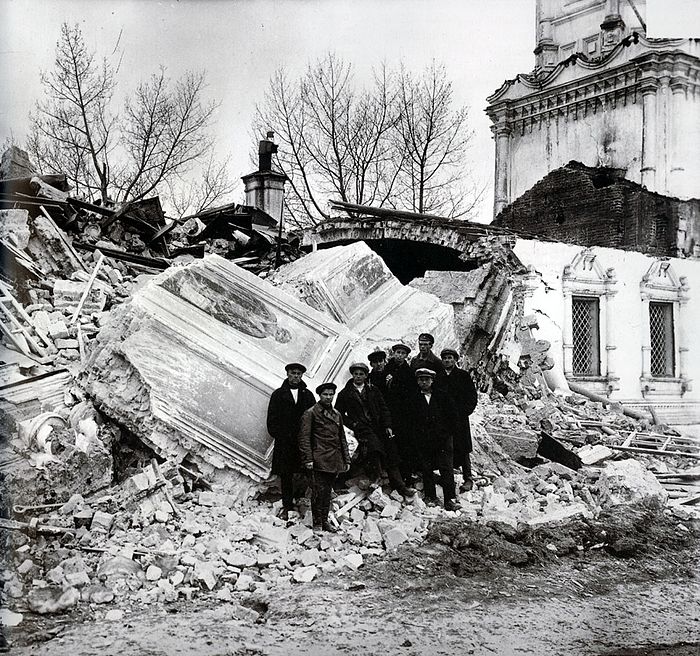
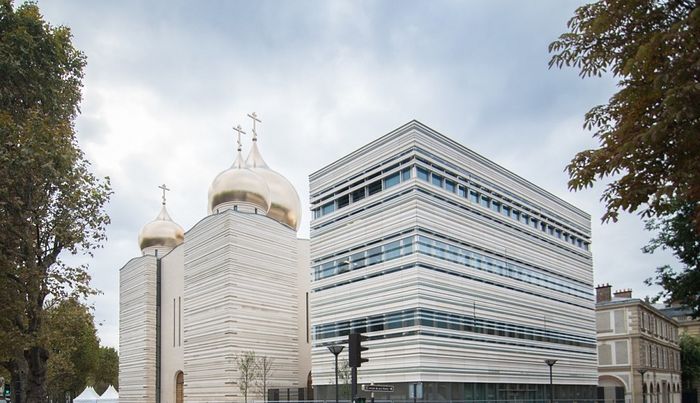
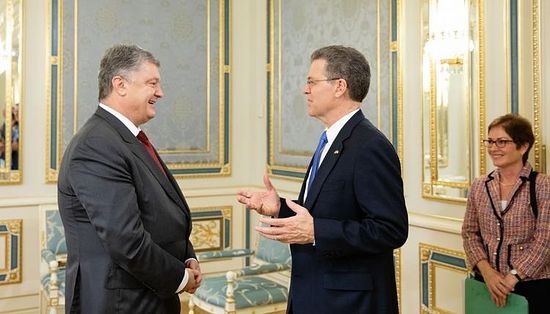
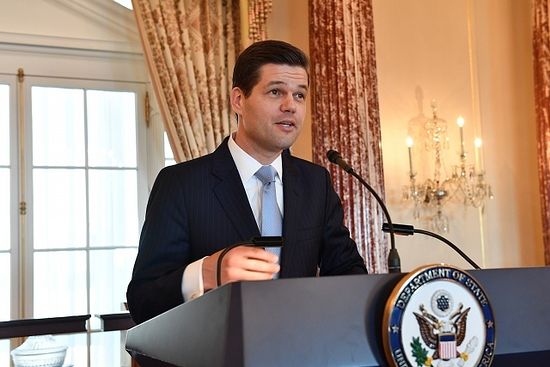
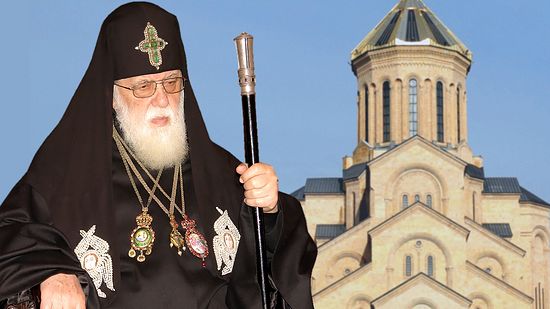
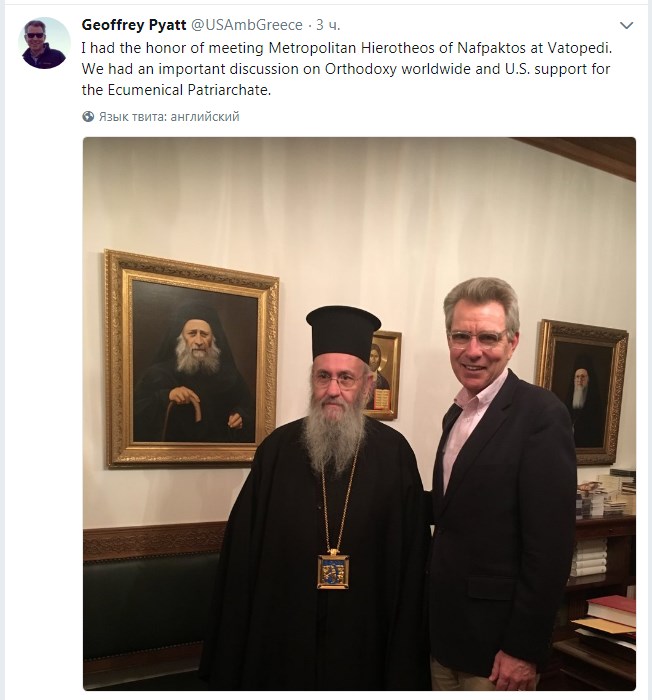
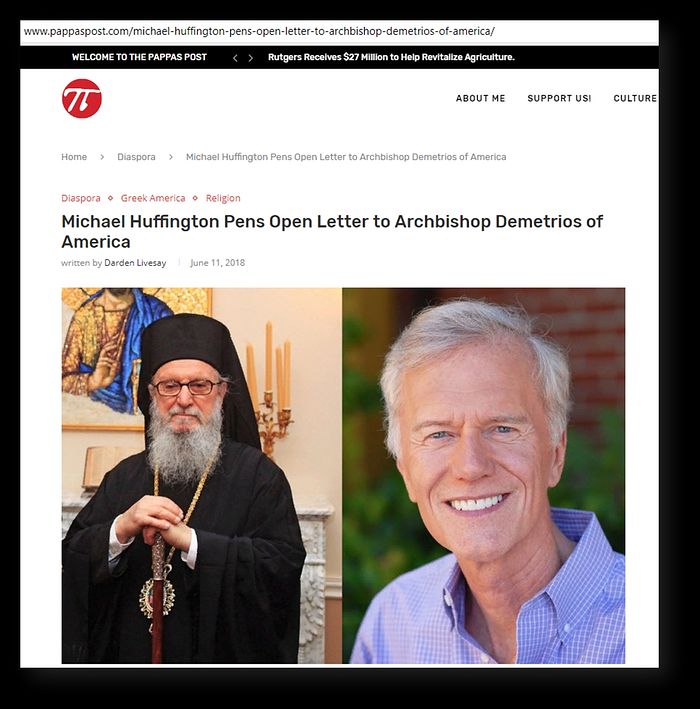
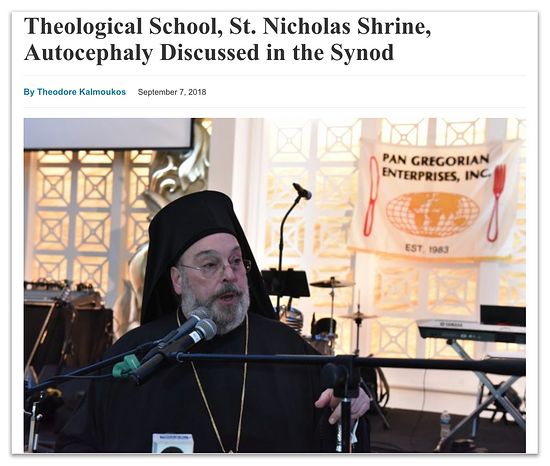
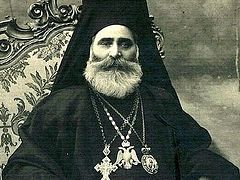
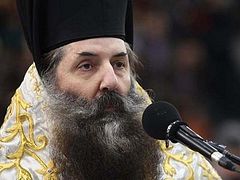
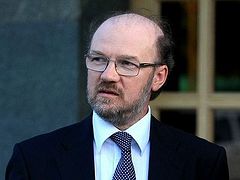
https://www.breitbart.com/big-government/2015/10/26/joe-biden-receives-greek-orthodox-human-rights-award-maybe-greatest-honor-public-life/amp/